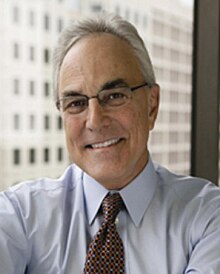Gregory Balestrero
American industrial engineer
Gregory Balestrero (born July 16, 1947) is an American industrial engineer, and CEO Emeritus of the Project Management Institute. He has a record of overseeing administrative, financial and internal affairs for professional associations.

- G. Balestrero, 1990.
Quotes
edit1990s
edit- This decade holds many changes for the United States, but the greatest needs regarding America's productivity in the 1990s, are better education and employee training.
- American Society of Mechanical Engineers, Society for Integrated Manufacturing (1990). Manufacturing Review v.3 no.1-3 1990. p. 131.
- Employees cannot become more productive in every sense of the word unless they are provided with continuous on-the-job training.
- NACE International (1990). Materials Performance. p. 104.
- Companies have a responsibility to train and retrain their employees.
- Graduating Engineer. v.12 1990/1991 McGraw-Hill, 1990. p. 14.
- The rapid deterioration of education has been recognized as a national problem for the past several years. Consequently, American businesses must meet the immediate challenge of poorly-educated people in today's workforce by strengthening employee training programs.
- Public power (1990) Volume 48. American Public Power Association. p. 9
2000s
edit- Great leaders recognize that companies must innovate to remain competitive, and they nurture environments that encourage creative thinking... Innovation is rarely accidental — it takes an organizational commitment that starts at the executive level. The idea is not enough. As Thomas Edison said, innovation is 1% inspiration and 99% perspiration. Too often companies forget the ‘perspiration’ or execution part of the equation.
- Balestrero (2008) quoted in: "America the Innovator The New Rules for Global Market Growth" By Karen A. Edelman. Forbes : A Special Advertising Section. Accessed 3 Dec 2008.
2010s
edit- Dr. Cleland was among the first to see project management strategically as well as tactically, at the center of organizational competencies... It's hard to believe, but there was a time when it was new and unfamiliar. Dr. Cleland was a driving force behind the adoption of project management as a professional competency, and is a key contributor to the success of all organizations that use professional project management standards and methodologies today.
- Balestrero cited in: G.R. Boyet & M. Maguire Kelly (2010) PMI Pays Tribute to Dr. David I. Cleland for a Lifetime of Achievement to Project Management and the Profession. at pmi.org. 13 July 2010.